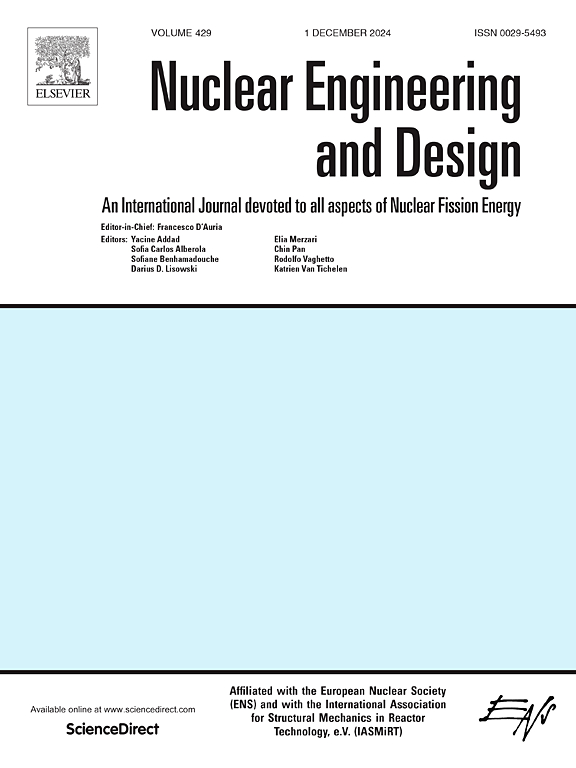A quantitative analysis of ATF surface characteristics on critical heat flux using Machine learning
IF 2.1
3区 工程技术
Q1 NUCLEAR SCIENCE & TECHNOLOGY
引用次数: 0
Abstract
The effects of surface characteristics on pool boiling Critical Heat Flux (CHF) are qualitatively understood based on previous investigations. However, more quantitative analyses are needed since the existing CHF correlations do not provide good predictions for modified surfaces. Using machine learning (ML) models as a tool, this study performed a quantitative analysis of relevant CHF parameters under pool boiling conditions: pressure, a dimensional feature, average roughness, static contact angle, surface orientation, and substrate thermal effusivity. A database was constructed by collecting accident tolerant fuels (ATF) CHF experimental data available from fourteen published studies. After hyperparameter optimization, the random forest (RF) model was selected for achieving the best fitting scores relative to other tested models. Feature importance models ranked static contact angle and pressure as the most important features, which is consistent with some of the literature CHF predictive models that take the surface characteristics into consideration. Finally, CHF predictions were obtained and compared to CHF experimental data. The effect of each feature on CHF was analyzed, while keeping other features fixed, by observing the experimental and predicted datapoints trends. The RF model demonstrated the ability to capture the experimental data trends, showing the RF model is suitable as a predictive pool boiling CHF model for this database.
基于机器学习的ATF临界热流表面特性定量分析
表面特性对池沸腾临界热流密度(CHF)的影响在以往的研究基础上得到了定性的认识。然而,由于现有的CHF相关性不能很好地预测修饰表面,因此需要更多的定量分析。本研究使用机器学习(ML)模型作为工具,对池沸腾条件下的相关CHF参数进行了定量分析:压力、尺寸特征、平均粗糙度、静态接触角、表面取向和衬底热渗出率。通过收集14项已发表研究的事故容忍燃料(ATF) CHF实验数据,构建了一个数据库。经过超参数优化后,选择随机森林(RF)模型相对于其他被测试模型获得最佳拟合分数。特征重要性模型将静接触角和压力列为最重要的特征,这与一些文献中考虑表面特征的CHF预测模型一致。最后,对CHF进行预测,并与CHF实验数据进行比较。在保持其他特征不变的情况下,通过观察实验和预测数据点的趋势,分析每个特征对CHF的影响。实验结果表明,射频模型能够捕捉实验数据的趋势,表明该模型适合作为该数据库的预测池沸腾CHF模型。
本文章由计算机程序翻译,如有差异,请以英文原文为准。
求助全文
约1分钟内获得全文
求助全文
来源期刊

Nuclear Engineering and Design
工程技术-核科学技术
CiteScore
3.40
自引率
11.80%
发文量
377
审稿时长
5 months
期刊介绍:
Nuclear Engineering and Design covers the wide range of disciplines involved in the engineering, design, safety and construction of nuclear fission reactors. The Editors welcome papers both on applied and innovative aspects and developments in nuclear science and technology.
Fundamentals of Reactor Design include:
• Thermal-Hydraulics and Core Physics
• Safety Analysis, Risk Assessment (PSA)
• Structural and Mechanical Engineering
• Materials Science
• Fuel Behavior and Design
• Structural Plant Design
• Engineering of Reactor Components
• Experiments
Aspects beyond fundamentals of Reactor Design covered:
• Accident Mitigation Measures
• Reactor Control Systems
• Licensing Issues
• Safeguard Engineering
• Economy of Plants
• Reprocessing / Waste Disposal
• Applications of Nuclear Energy
• Maintenance
• Decommissioning
Papers on new reactor ideas and developments (Generation IV reactors) such as inherently safe modular HTRs, High Performance LWRs/HWRs and LMFBs/GFR will be considered; Actinide Burners, Accelerator Driven Systems, Energy Amplifiers and other special designs of power and research reactors and their applications are also encouraged.
 求助内容:
求助内容: 应助结果提醒方式:
应助结果提醒方式:


